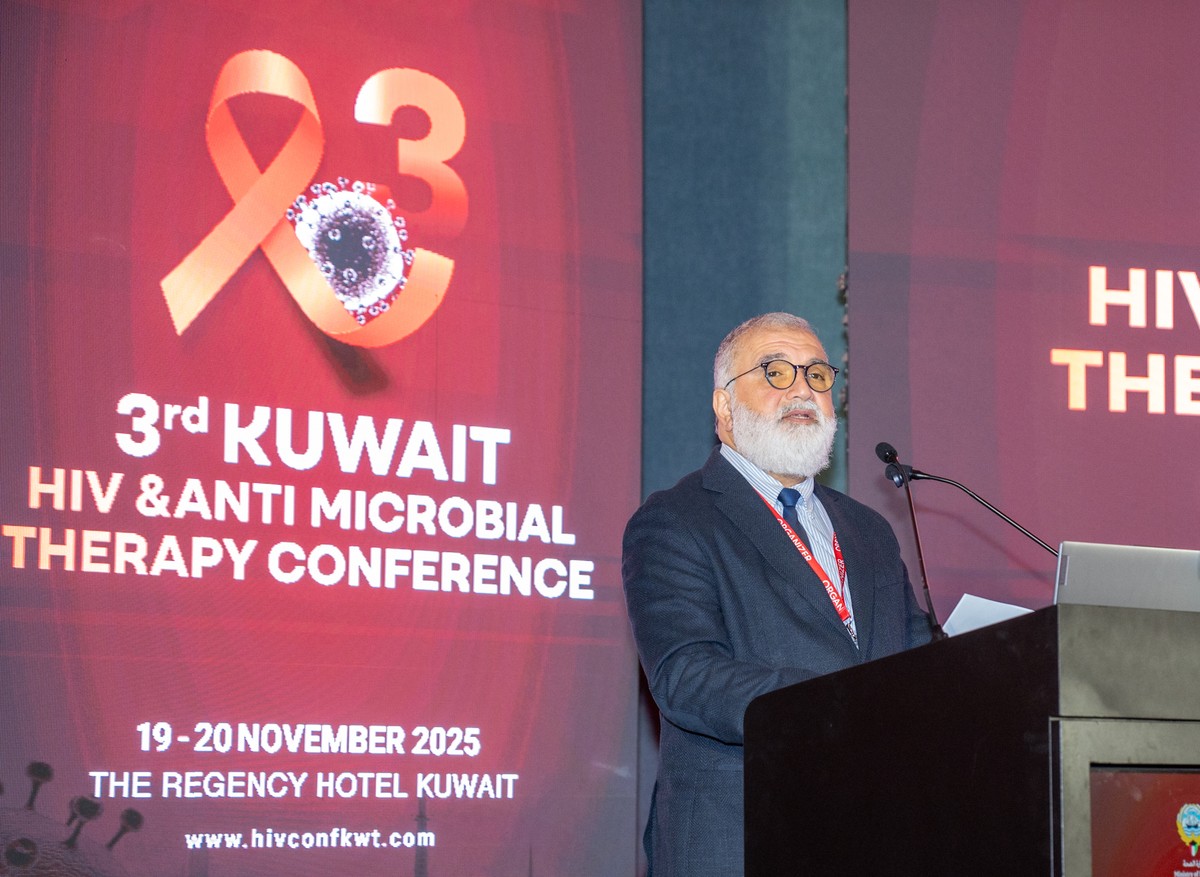19/11/2025
19/11/2025

KUWAIT CITY, Nov 19: Kuwait’s Minister of Health, Dr. Ahmad Al-Awadhi, said the Third Kuwait Conference on AIDS and Antimicrobial Therapy reaffirms the country’s commitment to national, regional, and international efforts to combat communicable diseases, promote public health, and advance its sustainable development vision centered on “health for all.”
In his opening address to the conference on Wednesday — delivered on his behalf by the Ministry’s Assistant Undersecretary for Public Health, Dr. Al-Mundhir Al-Hasawi — Minister Al-Awadhi said that discussing the fight against AIDS goes beyond reviewing achievements or statistics. It represents a humanitarian, ethical, and national commitment that reflects a deep belief in human dignity and the right to a safe and decent life.
He highlighted Kuwait’s “tireless efforts” to support global health initiatives and strengthen international cooperation. Citing the latest Joint United Nations Programme on HIV/AIDS (UNAIDS) report, the minister said Kuwait has made “exceptional progress,” placing it at the forefront of Arab and regional states in diagnosis, treatment, and viral suppression. This progress, he added, stems from expanding early detection and offering free, safe treatment to all targeted groups in line with UN goals to end AIDS as a public health threat.
Al-Awadhi said Kuwait remains firmly committed to bolstering prevention, sustaining services, and intensifying awareness programs grounded in human rights and health equity, with the aim of creating a society free of stigma and discrimination. He stressed that the rational use of antimicrobials “is no longer optional but a national and global necessity” to preserve the effectiveness of essential medicines and protect future generations from drug resistance.
The minister also announced that Kuwait is approaching a “new national achievement” with the opening of the new Infectious Diseases Hospital, describing it as a “qualitative leap” in healthcare delivery. The hospital will offer advanced specialized services, modern equipment, and serve as a leading research center supporting evidence-based health policies and international standards.
He expressed hope that the conference will generate recommendations that strengthen strategies to combat infectious diseases, rationalize antibiotic use, and enhance Kuwait’s position as a regional center in public health and medical research.
Conference chairman and head of the organizing committee, Dr. Osama Al-Baqsami, said this year’s gathering continues to serve as a scientific platform uniting physicians, researchers, and experts from Kuwait and abroad to address HIV/AIDS, sexually transmitted diseases, and the growing threat of antibiotic resistance.
Al-Baqsami said the health sector is entering a rapidly developing era marked by major breakthroughs in diagnosis and treatment, offering unprecedented opportunities to better understand diseases and enhance management efficiency. The conference, he added, is an important venue for reviewing scientific advances, new technologies, shared experiences, and evidence-based practices.
He underscored Kuwait’s “prominent regional role” in combating AIDS and infectious diseases, as well as its work to curb antimicrobial resistance through national programs, updated treatment protocols, community awareness efforts, and continuous training of healthcare workers. Regarding the new Infectious Diseases Hospital, Al-Baqsami said the facility will significantly strengthen Kuwait’s healthcare system with advanced laboratories, an endoscopy unit, dental services, a modern physiotherapy department, and state-of-the-art intensive care capabilities.
He noted that this year’s conference adopts a multi-layered approach, featuring scientific sessions for clinicians and researchers, as well as interactive sessions for social workers, imams, and media professionals, recognizing the shared responsibility of prevention beyond the medical sphere.
For her part, Dr. Ibtisam Al-Huwaidi, Director of the Infectious Diseases Hospital, said the conference reflects the Ministry of Health’s commitment to advancing scientific research and aligning with global developments in preventing, treating, and controlling infectious diseases.
She said the two-day event focuses on key challenges related to HIV, the latest updates in prevention and treatment, and effective strategies to counter antimicrobial resistance and reduce irrational antibiotic use.



